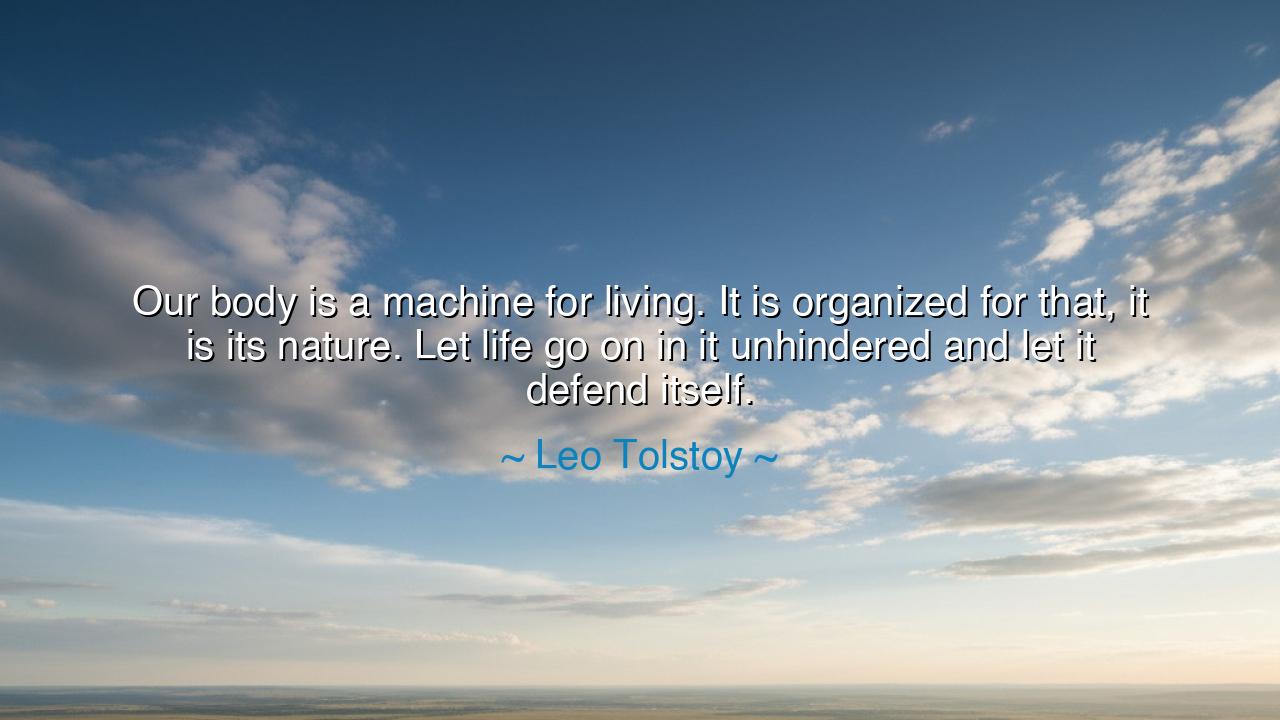
Our body is a machine for living. It is organized for that, it
Our body is a machine for living. It is organized for that, it is its nature. Let life go on in it unhindered and let it defend itself.






Leo Tolstoy, the sage of Yasnaya Polyana, once spoke with stark clarity: “Our body is a machine for living. It is organized for that, it is its nature. Let life go on in it unhindered and let it defend itself.” These words may seem plain, yet they carry the weight of a philosophy born of long reflection. Here, Tolstoy presents the body not as an ornament to be worshipped nor as a burden to be despised, but as a machine — precise, functional, divinely ordered to sustain life. His wisdom invites us to live in harmony with this natural order, neither pampering nor abusing, but respecting the sacred simplicity of its design.
The meaning of his words is a call to balance. The body, he says, is already organized by nature to endure, to heal, and to protect itself. Too often men corrupt this order, overindulging in pleasures, shackling themselves to luxuries, or, conversely, despising their bodies with neglect. Tolstoy urges us to step aside and allow the body to do what it was created to do — to live unhindered, to repair itself, to be the vessel of life rather than the battlefield of endless human vanity.
The origin of this belief can be traced to Tolstoy’s later years, when he turned away from aristocratic excess and embraced a life of simplicity, labor, and ascetic practice. He sought to honor the nature of the body through moderation, vegetarianism, and work in the fields alongside peasants. To him, the grandeur of life lay not in the adornment of the body, but in its function as the bearer of spirit and action. His words echo ancient philosophies as well — the Stoics, who taught harmony with nature, and the Taoists, who saw the body as part of the great flow of existence.
History bears witness to the truth of his counsel. Consider the Roman general Cincinnatus, who, after leading Rome to victory, returned to his plow rather than seizing power. His strength was not born from luxury but from living in rhythm with the land, allowing his body to remain simple and uncorrupted. Or recall Mahatma Gandhi, who, like Tolstoy, embraced simplicity of body, fasting and laboring, yet whose frail frame carried the endurance to challenge an empire. These examples reveal the paradox Tolstoy names: that the body, when left free to live as it was made, becomes stronger than when smothered by excess.
Tolstoy also speaks of the body’s power to defend itself. Within us lies an innate resilience — the ability to heal wounds, to fight sickness, to endure hardship. The wisdom here is trust: trust in the natural order, trust in the strength woven into our flesh. To constantly intervene, to burden the body with excess medicines, indulgences, and fears, is to deny this strength. He teaches us to live so that the body may guard itself, rather than enslaving it to our restless interference.
The lesson for future generations is profound. Treat the body as a servant, not as a master; as a vessel, not as an idol. Do not despise it, for it is sacred in its design, yet do not worship it, for its glory lies in function, not appearance. Honor its rhythms with rest, nourish it with moderation, strengthen it with labor, and above all, do not obstruct the natural wisdom it already carries within.
Practical actions arise from this teaching. Live simply. Do not overburden the body with gluttony or idleness. Allow yourself to labor, to breathe, to walk under the sun. Trust the body’s healing power, but also care for it wisely: with wholesome food, clean water, and peaceful sleep. Let your spirit guide your body, and let your body sustain your spirit. When hardship comes, endure with patience, knowing that nature itself has armed you with strength.
Thus, Tolstoy’s words endure as both command and comfort: the body is a machine for living. It is not ours to corrupt with endless vanity, nor ours to crush with neglect. It is a sacred mechanism, organized for life, designed for resilience. To live well is to let it perform its holy work unhindered, and to walk in harmony with the simple, enduring rhythms of nature. In this way, we honor both body and spirit, and fulfill the balance for which we were created.






AAdministratorAdministrator
Welcome, honored guests. Please leave a comment, we will respond soon